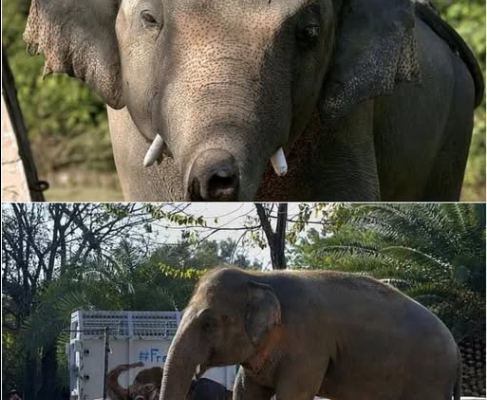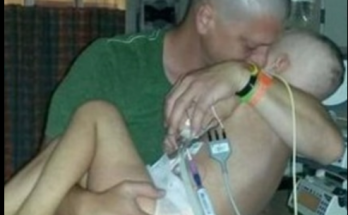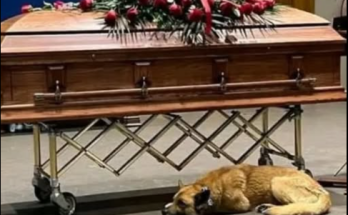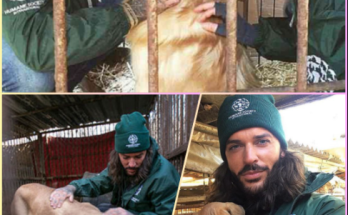Kaavan, an elephant long referred to as the “world’s loneliest,” is finally on the brink of a new beginning, thanks in part to the advocacy of international animal welfare groups and the star power of Cher, the legendary singer and actress. Her visit to Pakistan marks a significant milestone in Kaavan’s decades-long journey from neglect and isolation toward freedom, companionship, and care in a proper sanctuary.
For 35 years, Kaavan has lived at the Marghazar Zoo in Islamabad, Pakistan, enduring conditions that left him physically and emotionally scarred. Many of those years were spent in chains, with minimal space to move, limited social interaction, and inadequate care. His situation became particularly tragic following the death of his partner in 2012. The female elephant passed away from a gangrenous infection, and her body remained near Kaavan for several days before removal. The loss left Kaavan devastated, highlighting the deep emotional capacity of elephants and the profound impact of isolation.
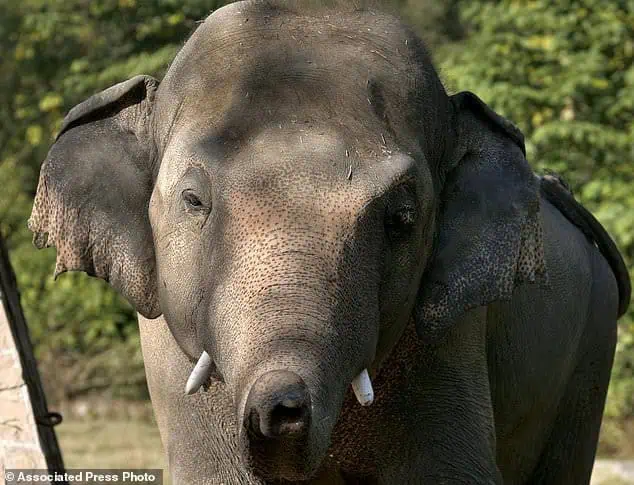
Over the years, Kaavan’s plight drew international attention. Animal welfare organizations, most notably Four Paws International, campaigned tirelessly for his relocation to a sanctuary where he could live a dignified life. Dr. Amir Khalil, a veterinarian with Four Paws, first encountered Kaavan in 2016 and returned in August 2020, dismayed by the elephant’s deteriorating condition. Under his care, Kaavan had developed behavioral issues, such as repetitive head-shaking, a common sign of boredom and psychological distress in captive elephants. He was overweight, malnourished, and suffering from cracked and overgrown nails caused by improper living conditions.
Cher’s involvement brought unprecedented visibility to Kaavan’s story. The pop icon has long advocated for his relocation, using her platform to pressure authorities and raise public awareness. During her visit to Pakistan, Cher met with Prime Minister Imran Khan to discuss Kaavan’s relocation. A video released by the Prime Minister’s office showed Cher and Khan seated together outdoors, underscoring the high-level attention the issue has received. Following the meeting, Cher expressed her gratitude on social media, thanking the Prime Minister for helping make the move to Cambodia possible and revealing that she is documenting Kaavan’s journey in a heartwarming film.
The move to Cambodia, scheduled for Sunday, will finally give Kaavan the opportunity to live in a suitable sanctuary. There, he will be welcomed by other elephants, including three female elephants who are already acclimating to the environment. Dr. Khalil hinted that Kaavan may even find a new companion, offering hope that the emotional void caused by years of isolation may finally be filled.
Kaavan’s rehabilitation in Islamabad over the past several months has been extensive. Dr. Khalil and his team worked tirelessly to improve his physical health, transitioning him from a diet that included 250 kilograms (550 pounds) of sugarcane daily to a balanced intake of fruits and vegetables. The dietary changes resulted in Kaavan shedding an impressive 450 kilograms, approximately half a ton, marking a significant step in preparing him for the long flight and life in the sanctuary.

Beyond physical care, Kaavan has also been receiving psychological support. Dr. Khalil described how he has formed a strong emotional bond with Kaavan, noting that the elephant now responds to his voice and has become calmer and more relaxed. This trust and cooperation are crucial for ensuring Kaavan’s safe transport and successful adaptation to a new home. It is a testament not only to Kaavan’s resilience but also to the dedication and expertise of the veterinary and animal care teams who have spent months preparing him.
The timing of Kaavan’s relocation coincides with recent legal developments in Pakistan. In May, the country’s high court ordered the closure of the Marghazar Zoo, citing inadequate care for its animals. Since then, Kaavan has been under the care of Four Paws and the Islamabad Wildlife Management Board, who have coordinated closely to ensure that every aspect of his transfer is managed safely.
Kaavan’s story is a powerful reminder of both the vulnerability of captive wildlife and the positive impact that dedicated advocacy and celebrity involvement can have. Martin Bauer, a spokesperson for Four Paws, emphasized that public figures can catalyze change: “When public figures support important issues, it sparks conversation and puts pressure on authorities to take action.” Cher’s advocacy has undoubtedly accelerated Kaavan’s relocation and increased global awareness of the challenges faced by captive elephants.
As Kaavan prepares to leave Pakistan, the international community watches with hope and anticipation. His story resonates far beyond the boundaries of a single zoo—it highlights broader issues of animal welfare, the psychological needs of highly social and intelligent species, and the transformative potential of rehabilitation and sanctuary care. For Kaavan, the move represents not just a change of scenery but a profound shift toward freedom, companionship, and the chance to live in a setting that respects his physical and emotional needs.
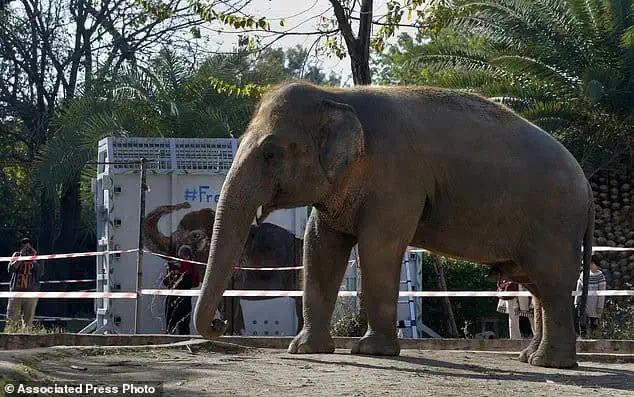
The sanctuary in Cambodia is fully equipped to provide Kaavan with ongoing care. Experts will continue to monitor his health, behavior, and integration with other elephants, ensuring that the decades of neglect and isolation do not define the remainder of his life. This new chapter promises enrichment, social interaction, and an environment designed to meet the unique needs of an elephant who has endured unimaginable loneliness.
Kaavan’s journey also serves as an example of the importance of international cooperation in wildlife conservation. From advocacy groups to government officials and celebrities, the collaborative effort to rescue and relocate Kaavan demonstrates how combined resources and public pressure can achieve meaningful outcomes for individual animals and species conservation.
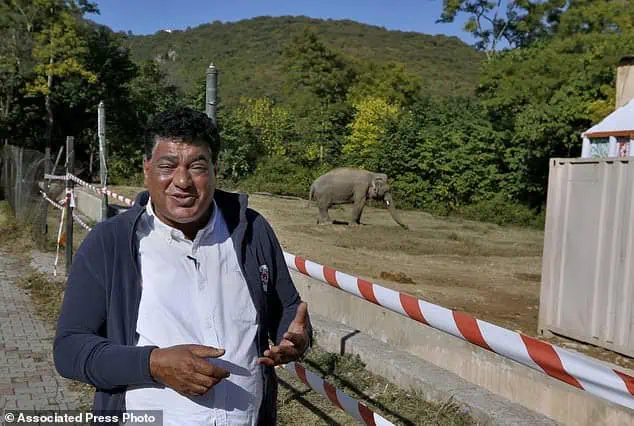
For years, Kaavan’s existence at the Marghazar Zoo was marked by confinement, isolation, and suffering. Today, as the preparations for his relocation reach their final stages, his story is one of hope, perseverance, and resilience. The image of Kaavan walking free, interacting with other elephants, and thriving in a sanctuary environment represents not only the culmination of years of advocacy but also the potential for a brighter future for other captive animals in need.
As Cher continues her visit and prepares to witness Kaavan’s transition, the world celebrates a milestone for animal welfare and the triumph of persistent, compassionate advocacy. Kaavan’s journey, once defined by loneliness and neglect, is now being rewritten with the promise of companionship, care, and a life that honors his intelligence and emotional depth.
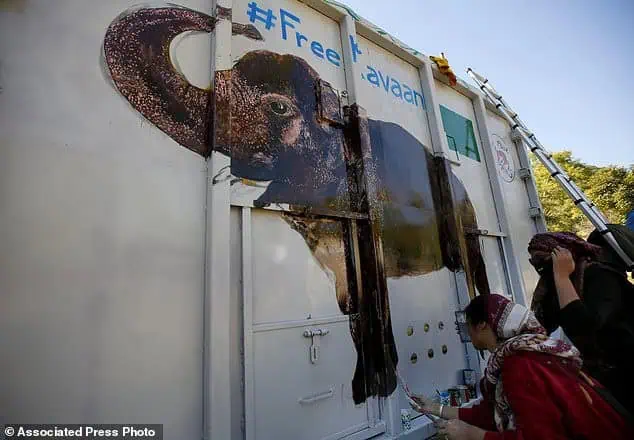
For Kaavan, the next step is more than a physical relocation—it is the start of a life in which his needs are met, his health is prioritized, and his emotional well-being is nurtured. As the aircraft prepares to carry him to Cambodia, those who have dedicated themselves to his care can finally breathe a collective sigh of relief. The “world’s loneliest elephant” is no longer alone.
Kaavan’s story is a beacon of hope and a call to action. It reminds us that individual intervention—whether through advocacy, veterinary care, or public awareness—can change the life of a single animal in profound ways. And it demonstrates that with perseverance, collaboration, and compassion, even the most challenging situations can be transformed into triumphs.
The Miracle on Sharp Mountain: Hiker’s Dog Leads Him to Missing Golden Retriever Trapped in a Coal Pit – 485

High on the icy slopes of Sharp Mountain in Pottsville, Pennsylvania, the winter air was still and silent. Snow coated the pines, the trails were slick with frost, and even the sound of birds had quieted in the cold. But somewhere beneath that stillness — in the darkness of a deep coal pit — a small, golden heartbeat refused to give up.
That heartbeat belonged to Freddy, a six-month-old golden retriever who had been missing for nearly a week. His family, Pam and Joe Palko, had searched every inch of their neighborhood, called out his name through the cold nights, and blanketed their community with flyers and pleas for help. They had even enlisted search dogs and thermal drones, clinging to hope as temperatures plunged into single digits.
They feared the worst. But on a quiet Monday afternoon, a miracle was already making its way toward them — guided by another dog’s instincts.
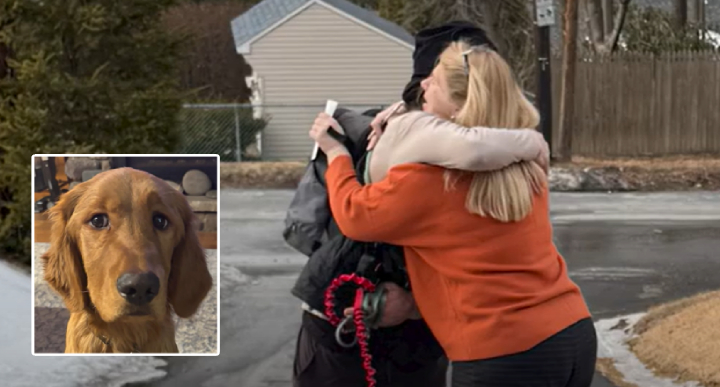
Collin Leiby, a wedding photographer and seasoned hiker, had set out that day to explore Sharp Mountain with his faithful dog, Bass. The pair had trekked those trails many times before, enjoying the solitude and challenge of the Pennsylvania wilderness. But this hike would be different.
As they moved along the frozen trail, Bass suddenly stopped. His nose lifted. His ears twitched. Then, without warning, he veered off the path.
“I thought maybe he smelled a deer,” Leiby said. “But he was insistent. He wanted to go down the embankment.”
Curious, Leiby followed his dog’s lead through the brush until he reached the edge of a deep coal pit — about ten feet down, dark and icy, surrounded by jagged rock. He looked closer, squinting through the dim light. That’s when he saw it — a flicker of gold, a tail barely moving.
It wasn’t a deer. It was a dog.
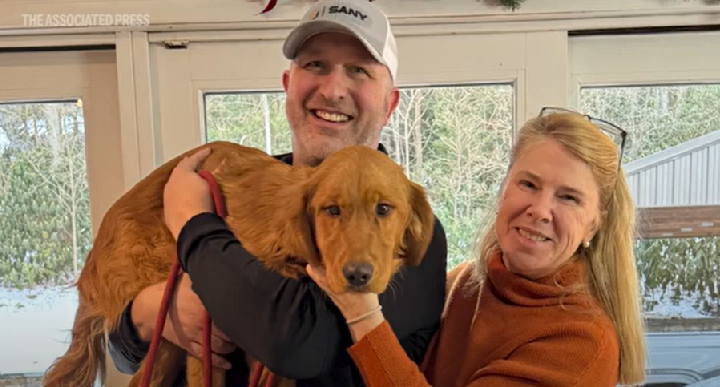
And not just any dog — it was Freddy, the missing golden retriever whose face had appeared all over social media and local flyers.
“A tear came to my eye,” Leiby recalled. “I started calling his name. He slowly got up and started walking toward us.”
The puppy was thin, trembling, and covered in soot. His paw pads were raw from scrambling against the coal. It was clear he had been trapped there for days, too exhausted to climb out.
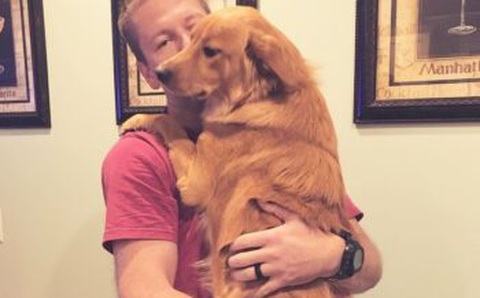
Freddy tried to scramble up the slick walls, his claws scraping against the rock, but his body was weak. Leiby stretched down as far as he could, grabbing the pup by the scruff and pulling him to safety.
When the golden retriever finally reached the top, he didn’t hesitate. He threw himself into Leiby’s arms, tail wagging furiously, whining with joy.
“He just wanted to be near us,” Leiby said. “You could tell he was relieved — like he knew he was finally safe.”
Leiby gave Freddy water, wrapped him in his jacket, and clipped a spare leash onto his collar. Side by side, the trio — man, his dog, and the rescued golden — made their slow descent down the mountain, Bass walking proudly beside his new friend as if he understood the gravity of what he’d done.
Meanwhile, the Palkos were at home, hearts heavy after seven days of searching. Freddy had vanished on February 17, disappearing into the woods behind their home. They had scoured every path, knocked on every door, and refused to stop even as hope began to fade.
Then, just before dusk, a miracle came knocking.
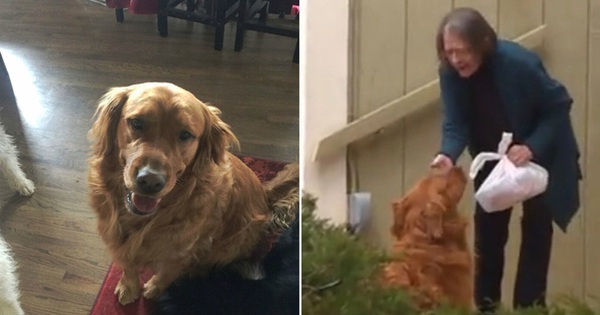
At a nearby home, Dr. Carolyn Canizaro-Orlowsky, a retired veterinarian and neighbor, opened her door to find a familiar golden figure standing on her porch — dirty, trembling, but alive.
“He was just a little frantic, hungry, and confused,” she told ABC News. “But when they showed up, he started wiggling.”
Within minutes, the Palkos arrived, their car skidding to a halt as they jumped out, calling his name. Freddy bounded toward them, tail wagging, whining in joy, pressing his face into their hands as if trying to erase the week of fear and cold from his memory.
Tears flowed freely. The couple could hardly believe it — their boy was home.
Freddy had lost about 10 pounds during his ordeal, but vets confirmed that aside from exhaustion and dehydration, he was healthy. Now back at home, he’s recovering in warmth and comfort — curled up beside his best friend, Harper, the Palkos’ two-year-old golden retriever.
For the family, who recently lost another beloved dog to cancer, Freddy’s return feels nothing short of divine. “It’s like we were given a second chance,” Pam said. “He’s part of our family — losing him would’ve been unbearable.”
The Palkos have since met with Leiby to thank him — and Bass — for their incredible act of compassion. “Without them, we might never have found Freddy,” Joe said. “They didn’t just save a dog — they saved a piece of our family.”
For Leiby, the experience has left a lasting mark. “I’ve always believed dogs have a sense we don’t fully understand,” he said. “Bass knew something was wrong before I did. He’s the real hero.”
As word of the rescue spread, the story captured hearts across the region. People celebrated the hikers’ compassion, the dogs’ unshakable intuition, and the community’s relentless faith.
“There’s a big collective sigh of relief,” said Dr. Canizaro-Orlowsky. “It’s a neat lesson not to give up.”
And in that lesson lies the true power of this story — that even in the harshest winter, kindness and instinct can cut through the cold.
Freddy’s ordeal is over now. He’s home, fed, and loved — a little thinner, perhaps, but stronger in spirit. Bass, the hiker’s loyal dog, continues his walks through Sharp Mountain, tail high, unaware that he’s become a local legend.
And for everyone who followed Freddy’s story, one truth shines bright as the winter snow begins to melt: sometimes, miracles don’t come from luck. They come from loyalty, love, and a dog who simply refused to pass by.
